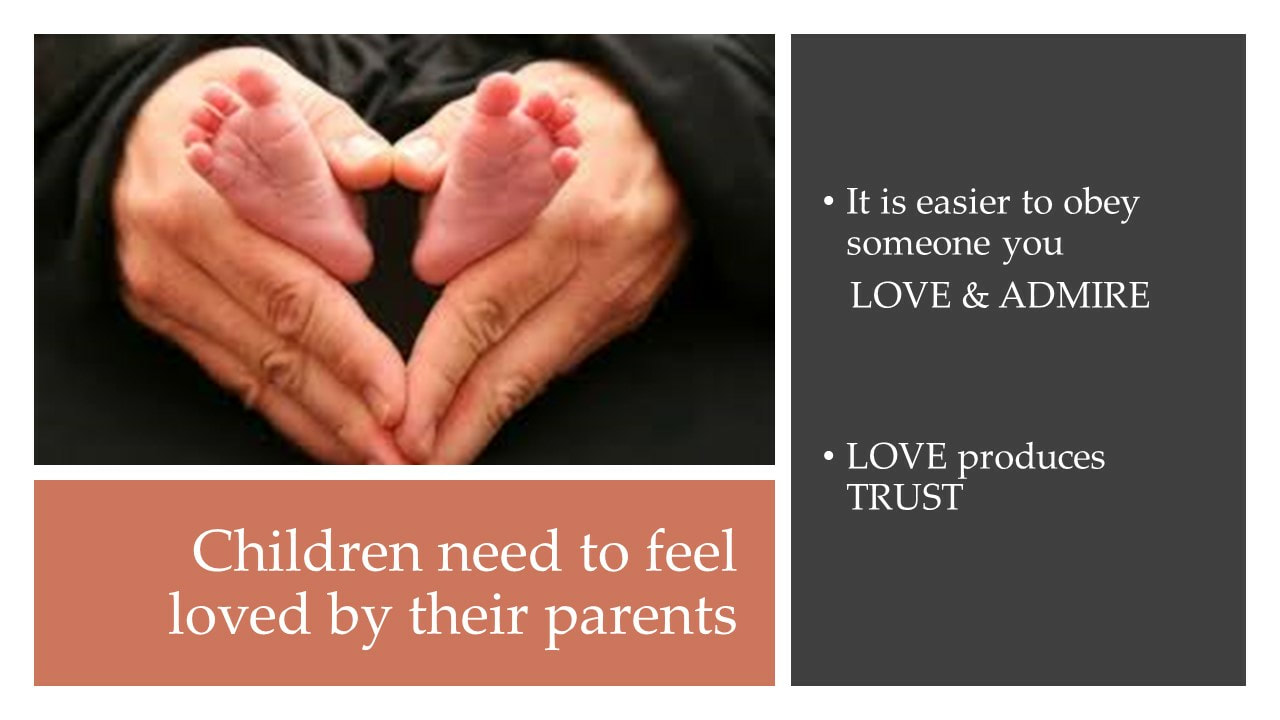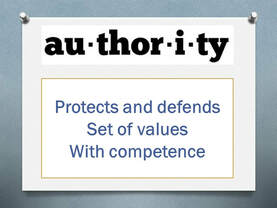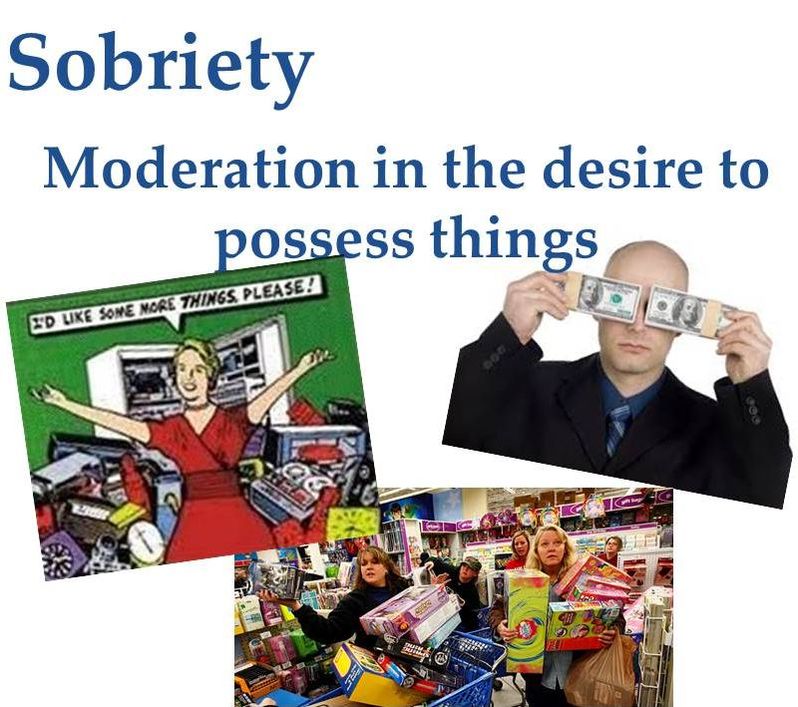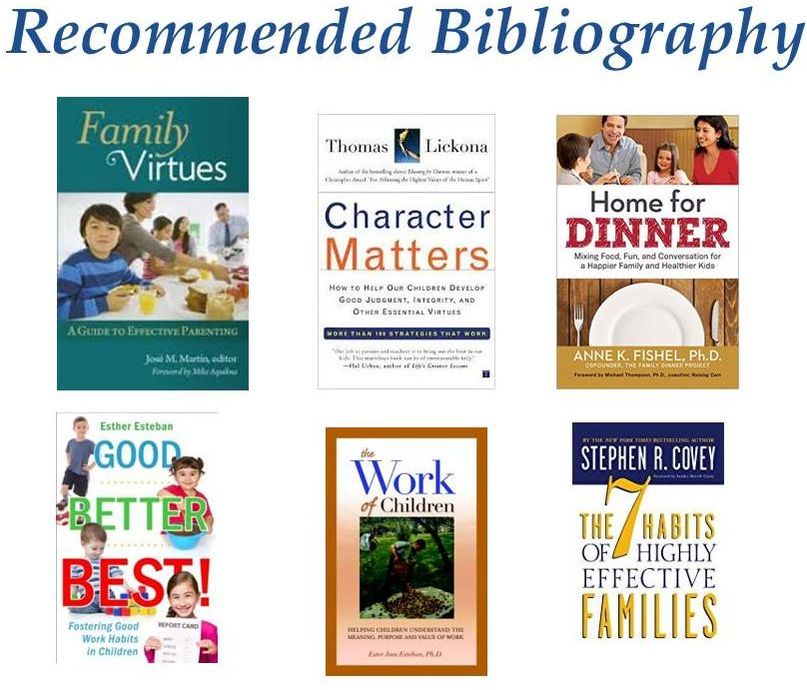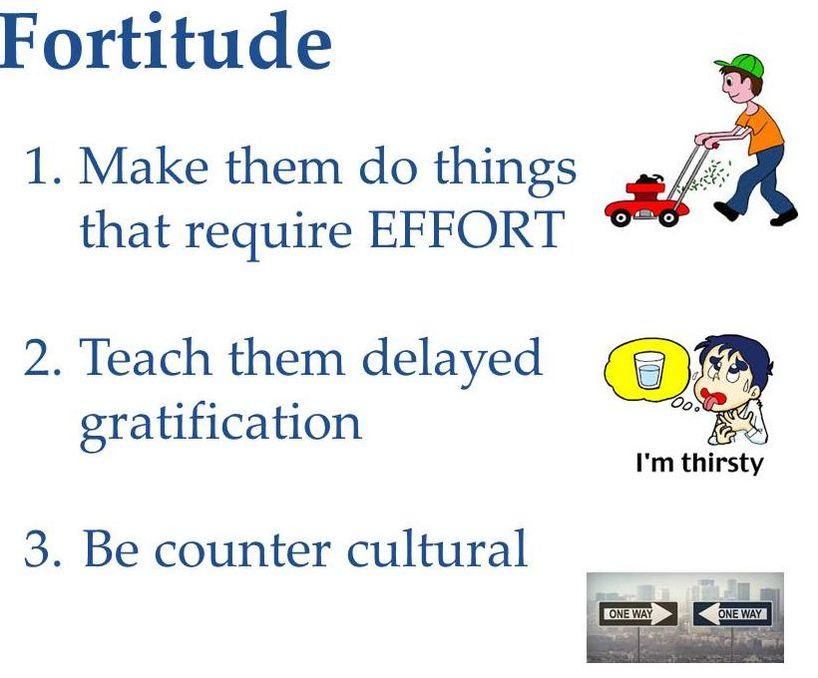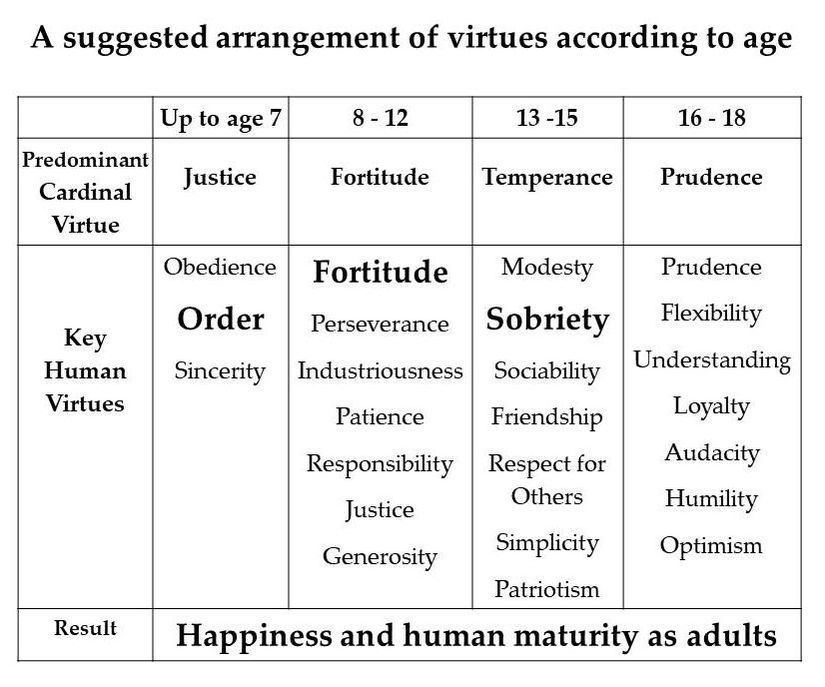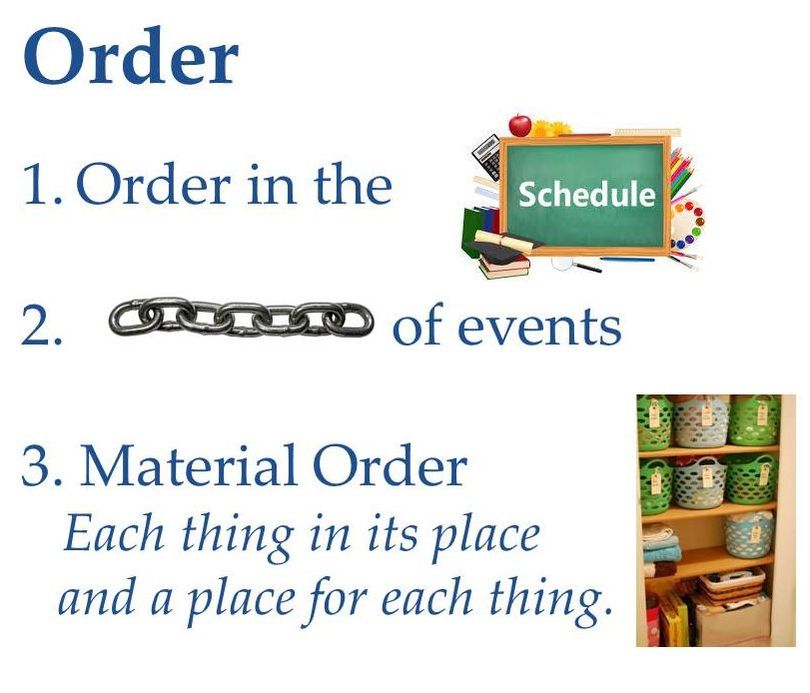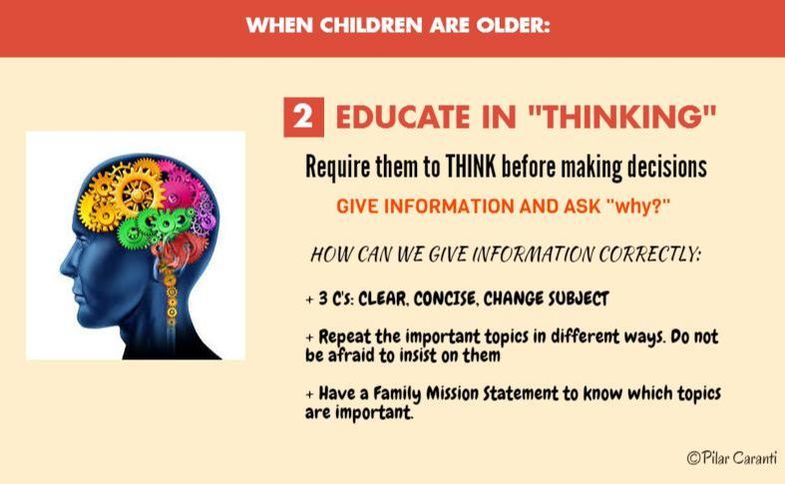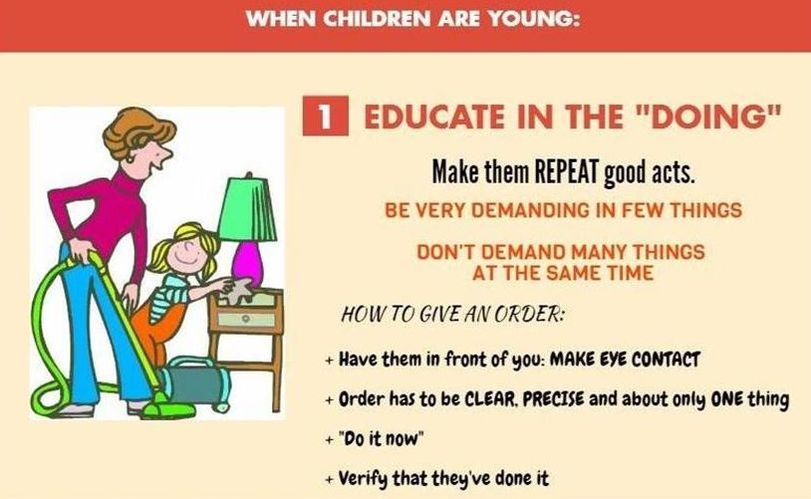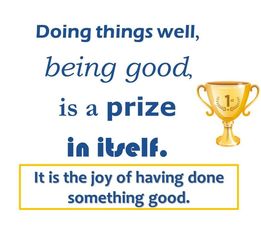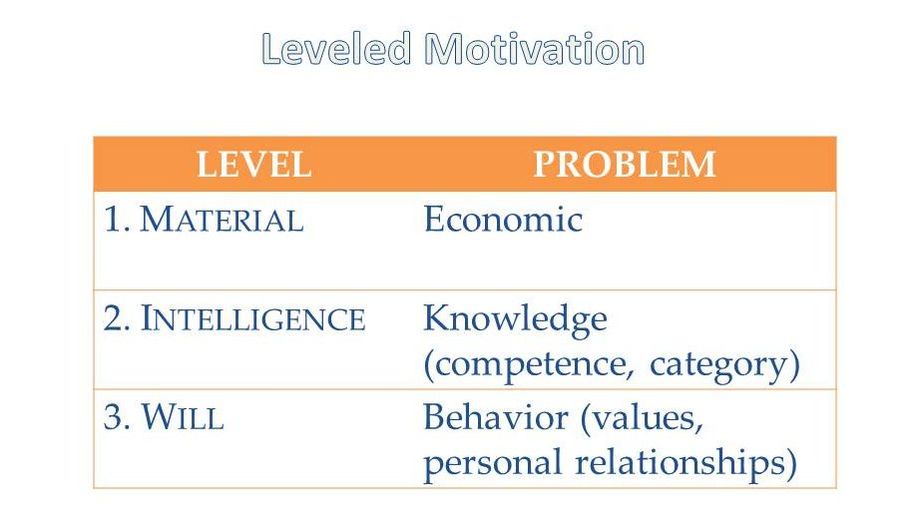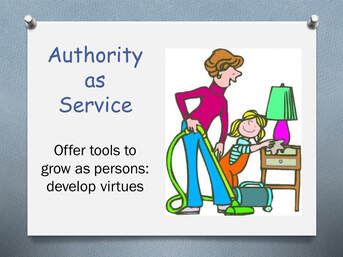 From what we have been saying, we see that authority has an eminently positive meaning and should be viewed as a service. Authority understood in this way: Is a reference point, a model a light that guides whoever follows it towards the goal he or she is seeking. a rod that supports the growth in virtue We exercise Authority as a service to our children. We struggle to become better persons ourselves, we protect and defend certain virtues and we help them grow in virtue and become an authority themselves. Exercising authority comes down to offering children, right from when they are very young, the tools they will need to grow as persons. and these tools are the virtues. 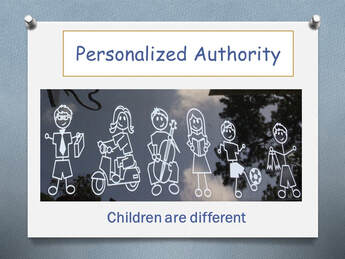 An important point I want to stress is that we shouldn't exercise authority by treating all children equally, because each one of them is different: Due to genetics, their temperament, their character, their age, their sex, their talents, interests, etc.. To exercise authority in the same way with all the children is unjust. Children will respond differently to the same prize or punishment. We shouldn't establish the same rules for everybody. Different ages makes it necessary to establish different rules. As children are different, the motivation will be different for each child, for one child it could be effective to tell him: "How happy your mom will be if you did this" and for another: "you will have more time to play if you do this right now". As children are different, the virtues that we will have to foster in them will be different. A child might be naturally orderly and be quick to anger while another one will be forgetful and with a good heart and temper. So in each one you have to correct the defect by fostering the opposite virtue. As children grow they will choose their own path, but they will only be able to choose from the capacities that they have developed. Rules and orders are not end in themselves, but means for raising our children. Exceptions to rules can be made but always accompanied by an explanation. 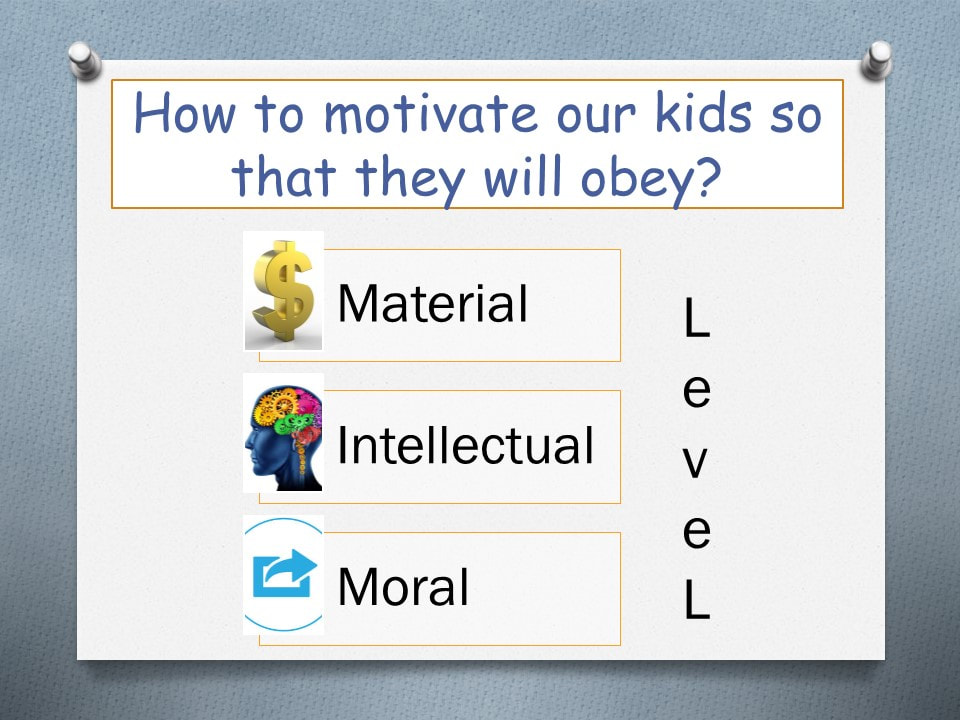 Now, I will share with you some practical points. We always have to convey to our children that to obey is good in itself, that we love them and that what we demand is good for them. When our kids disobey we have to use motivations. We can motivate our children in different ways and some motivations are more useful and better than others. We can motivate in a MATERIAL level. We use rewards and punishments so that we make them do what we want: We give you $$$ if you clean your room, we take your phone if you don’t do your homework. You can watch TV or play Fortnite if you walk the dog. Material motivations don’t help to educate because they act for material reasons instead of looking for the good in itself. Instead of promoting good habits you encourage consumerism and materialism. We can also motivate in an INTELLECTUAL level. We motivate our children by reasoning with them to do something. These types of motivations aim at doing something for their own good. Intellectual motivations are good but if we only use these, we run the risk of having our kids only to look for their own good. Motivations in the MORAL level: we give reasons to the intelligence to get the will to look for the good freely. They are also called transcendent, because they go beyond ourselves. You look for the good and you give it to others, you share it. Love, affection, giving our time. This is the best way to motivate our children. For example: "Let's go visit your grandma at the nursing home because it makes her happy." To foster virtues, the motivations have to come from the 3rd level, education of the will and values. To speak about virtue, acts have to be free and good, looking for the good in itself. This motive never ends. It always produces joy. The joy of having achieved a good, that joy is a prize in itself. Where if you study because they give you money, when you no longer receive money, you no longer study.
0 Comments
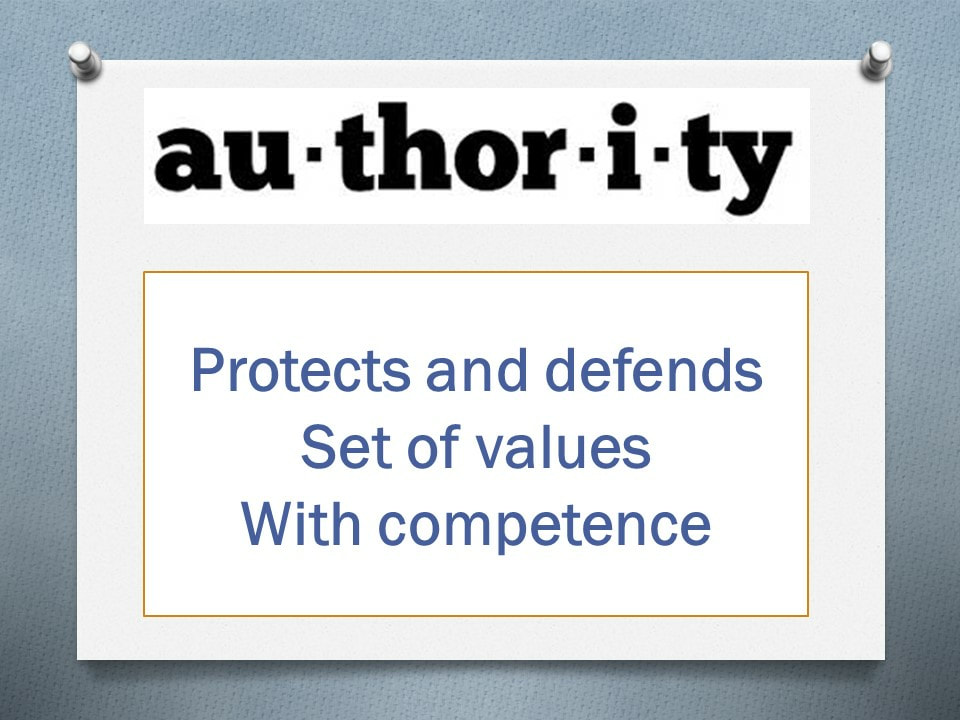 We know that the exercise of parental authority isn't always easy. Following the British educator, David Isaacs, we understand that a person has authority when he or she protects and defends a set of values with competence. He has authority over me if I appreciate those same values and recognize his or her competence in that subject. If we choose for example the value: health: we go to a doctor that has studied medicine and he defends the value health with competence and he is an "authority" for me in this area. The authority that we have with our children lies precisely in the values that we protect and defend with competence. It will be a good exercise to: - reflect what are the values that we are effectively living. - if our actions, our decisions are in accord with the end that we have set for us and our children. If we live “generosity, understanding and sincerity” we have authority with our children and we guide them in this direction. To educate is this process of guiding toward an authorship: that is, that our children become capable of protecting and defending some values with competence. 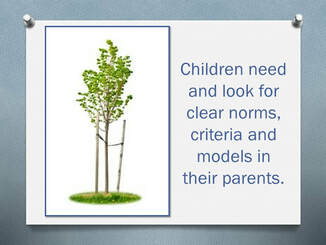 In fact, etymologically, the word “authority" comes from the Latin verb augere, which means “to make grow," “to develop.“ (Auctoritas: power and right to command. Auctor: the one who exercises this podwe and right.) When you grow a tree, it tends to grow upward, looking for light and becoming part of the environment. But in the process of growing, it will need, during a certain period of time, to be held by some stakes so that it grows straight and its roots settle in the ground, reaching its maximum potential. The tree that grows crooked will never straighten its trunk. The exercise of authority by us, the parents, is like the rod, the picket, placed by the newly planted tree that helps it grow straight. We are the rods that help prevent detours o correct them if they appear. We are the support and the hope of our children while we teach them how to support themselves. Children need and look for clear norms, criteria and models in their parents. We exercise authority precisely because we love our children and they need to feel loved. A love that is true, not soft or overprotective or possessive. The message "it is good that you exist" is conveyed in different ways: our children need to feel we are interested in his or her things, that we spend time with him or her, that we talk with him or her. Compliment them, give them: hugs, pats, winks...
Love is a powerful bond. Everyone finds it easier to obey someone that they love and admire. Love produces at the same time, trust. So the child completely trusts that, what his parents are asking, is for his own good. It could go against his laziness, his comfort or his playtime, but he knows that what they are asking of him, benefits him. Have a positive outlook when raising your kids! 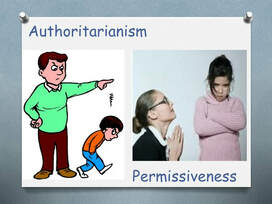 Before defining what Authority is, I will refer to the two extremes that we can easily fall into: PERMISSIVENESS and AUTHORITARIANISM. Sometimes, we as parents, are afraid to say no to our children, when they ask for the latest iPhone or Nike shoes. In fact, many parents have a fear of disciplining, perhaps because they themselves have suffered the negative consequences that can come from imposing things on children. They are afraid, for example, that their kids wouldn’t love them anymore, or that peace at home will be lost, or that their children will reject something that is good in itself. So they adopt a permissive attitude as an easier way out of a challenging situation. But the exercise of authority should never be confused with simply imposing our will on another person, or making sure we are obeyed at any cost, that would be authoritarianism. It is characterized by the expression “because I said so.” I know that the exercise of parental authority isn't always easy, that's why I'm writing about it on this post. Following the British educator, David Isaacs, we understand that a person has authority when he or she protects and defends a set of values with competence. He has authority over me if I appreciate those same values and recognize his or her competence in that subject. If we choose for example the value: Health, we go to a doctor that has studied medicine and he defends the value of health with competence and he is an "authority" for me in this area. The authority that we have with our children lies precisely in the values that we protect and defend with competence. So, it is good to reflect what are the values that you are effectively living? And if your actions, your decisions are in accord with the end that you have set for you and your children as I mentioned in the part 1 of this series. If we live the virtues of generosity, understanding and sincerity we have authority with our children and we guide them in this direction. To educate is this process of guiding toward an authorship: that is, that our children become capable of protecting and defending some values with competence. 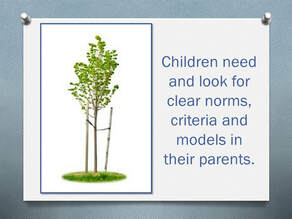 In fact, etymologically, the word “authority" comes from the Latin verb augere, which means “to make grow," “to develop.“ (Auctoritas: power and right to command. Auctor: the one who exercises this power and right.) When you grow a tree, it tends to grow upward, looking for light and becoming part of the environment. But in the process of growing, it will need, during a certain period of time, to be held by some stakes so that it grows straight and its roots settle in the ground, reaching its maximum potential. The tree that grows crooked will never straighten its trunk. The exercise of authority by us, the parents, is like the rod, the picket, placed by the newly planted tree that helps it grow straight. We are the rods that help prevent detours o correct them if they appear. We are the support and the hope of our children while we teach them how to support themselves. Children need and look for clear
norms, criteria and models in their parents. 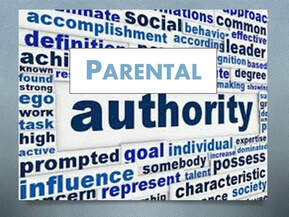 Parental authority is always a tricky subject because parents are always afraid of falling into one of the two extremes: Authoritarianism or Permissiveness. But before delving into the topic of parental authority I want to share two points that I think are very important when educating our children.  When we educate our children, we have to Begin with the END in mind, as Stephen Covey, the motivational speaker that died on July 2012, wrote in his book The 7 Habits of highly effective families. So, what kind of end do we have in mind for our family?
I think we can all agree that that every human being yearns for happiness. I am sure that there is no one that can honestly declare that he wants to be miserable or unhappy. What is Happiness? A classic definition of happiness states that a person is happy if she achieves to develop everything that she is, according to human nature. Reason, allows the person to discover what is good and with her Will she acts in accordance to what was seen as good and achieves a peaceful enjoyment of life. As you will see, the correct use of Parental Authority will help us achieve this end.  2. The other point to have in mind is that we are not raising kids but future adults. This is called Preventive Education, which is educating for the future. So to prevent is to learn how to educate better, without improvising. The theory of the Theater reminds us that the brain is a like an empty theater. Every chair is waiting for an idea, a concept, a good habit, etc. How easy is to sit something good when the chair is empty! And how difficult it is to sit when the chair is occupied! But if a bad habits sits down first, it is more difficult to change. But don’t get discouraged! No matter what the ages of your children are, it is never too late to start! But the sooner you start, the better it will be! Educating in the future is to get there early, so to speak, with the good habit. To prevent is to know how to appreciate a good friend, before having a bad one. It is to know the effects of drugs, before they offer it to you. To prevent is to know about the beauty of your body, before you are asked to have sex. It is to know that you don’t have to hang around evil, but to go in the other direction. To prevent is to know that you have to study to get good grades, before regretting later on. It is to know that the internet, video games, etc. create an addiction… To prevent is to know...
Stay tuned for part 2 of the series...
How to foster certain virtues.3. SobrietyWe live in a culture that says that having a lot of stuff, is good. To possess many things is actually the goal. To earn more money in order to have a larger home, a better car, the latest iPhone, more toys, more gadgets... Are these things bad in themselves? No, they are not; but a disordered desire and pursuit of them keep us from discovering, seeking and enjoying the real joys of life: friendship, love of neighbor, beauty, generosity, etc. Disordered desire for material possessions puts the focus on us, makes us self centered and takes away from our ability to love others, which is were the key to happiness is. If we want our children to be happy, we have to show them through “sobriety”, that happiness is not found in material things but in self-giving. Sobriety is part of the virtue of temperance and is related to the moderation in the desire to possess things. It can also to refer to moderation in the use of alcohol but I am going to stick to the moderation in the desire to possess things. That is why I want to talk about the virtue of sobriety which is a virtue that may not be in fashion but it’s important. Yes, we also have to live sobriety despite living in this affluent society. Again, like with any other virtue, if we want our children to live sobriety we have to give them the example. As Alvaro de Vicente, Head Master of The Height school in Potomac, Maryland, said recently in one of his talks: "Just because we are older and are making all the money it doesn’t mean we need a preferential treatment." Three principles to have in mind:
What are superfluous or unnecessary things? Brand name clothes for example. If everyone wears a Vineyard Vine shirt we might be tempted to buy it but is it necessary? It’s understandable that parents don’t want their children to lack what others have, or what they themselves lacked when they were growing up. But this doesn’t mean we should give them everything they want. As I said earlier: Offer kids what they NEED, not just what they WANT. We should teach our children not to make comparisons with the Jones’ or to try to imitate them in everything, as it can lead to a materialistic and superficial mentality. My son was telling me the other day how much it helped him the fact that when he was in HS and everyone was going to school in very expensive cars and he had to first ride the bus and then ride a scooter! Can you imagine what he looked liked against the BMW’s and Range Rovers? Teaching sobriety should be taught positively, helping children understand –explaining the why and teaching them to think- how to keep and use properly what they have, their clothes and toys and other things. Ask them: do you really need this? There is this mexican family I know, who were 11 kids and they had maids, cooks, a chauffeur, went to private schools, lived in a big house in a big neighborhood, etc. Despite all this, the youngest daughter thought they were poor because everytime she asked her dad for something he would invariably say: "Oh no, we don't have many for that." When he died she realized how wealthy they were and how wonderful her dad had been in teaching her sobriety. He wasn't lying, he was saying he didn't have money for those things that were no necessary. In order for them to habitually go without the unnecessary things, you have to present your children with higher ideals, higher goods –visit the elderly, help someone in need- as these will bring a deeper satisfaction and true happiness. David Isaacs says that: "Having a profound contact with the GOOD, the good in contrast with suffering, brings immense benefits when educating in virtue." This is the most difficult one to live unless we are forced too because the breadwinner of the family loses his/her job, the family loses everything due to a natural catastrophe (as it happened recently in Houston with hurricane Harvey). So many times, we need to consciously, make a point and go without some necessary things. We can start with something not so necessary: the cereal or drink we like, etc. "There’s no juice in the morning!" First world problem. "Hey, no complaining." Nutella is it really necessary? This being above material goods, brings joy. So think about these principles when doing your Christmas shopping for example. Or go over the toys with your children and ask them, which ones do they use, which ones they can give away. As a consequence, living by these principles will help you and especially your children live sobriety in the use of alcohol. As with every virtue that I mentioned, our children live it at the beginning because we demand it from them but then, they gradually live it because they want to! The contents of this lecture were taken from different sources:
Educar la Voluntad by Fernando Corominas Several lectures given by David Isaacs Hijos Felices. La educación de las Virtudes by Diego Ibañez Langlois How to foster certain virtues.2. FortitudeFortitude or -Resilience is a more trendy word, although it only emphasizes one aspect of fortitude. As I said when I started strengthening the character and forging a strong will has to be one of our primary objectives in the education of our children. Think of how this country was made, the pioneers, the immigrants, they had to face a lot of hardships, work in bad conditions, cold weather, they were tough, they were strong and so were their children. Nowadays, we live in a society with a lot of material comfort, that puts physical and emotional safety as number 1 priority and we are educating “softy and wimpy kids” that are lazy, selfish and want to be entertained all the time. The tendency is to not require any effort from our children and over-protect them from small failures. But we know life is hard, unfair and they are going to face difficulties, obstacles, setbacks... So we need to prepare them for life. 2. FortitudeSo how can you educate fortitude? 1. We have to make them do things that require effort. The dictionary defines effort as a vigorous or determined attempt to achieve something overcoming difficulties. So: don’t pack your child’s backpack, don’t carry her backpack, don’t bring to school his forgotten lunch box/agenda, and don’t peel a banana for a 5-year-old child. Teach them the skills rather than do things for them. I said that to acquire a habit we have to repeat good acts: so what I said earlier of the bedtime routine, also have a study routine, fighting distractions, their wanting to get up and play. Chores require effort. Have them do chores. Pick tasks that are simple and age-appropriate, instill a routine. Sticking to a routine can help turn tasks into a habit instead of a chore. Stay away from nagging Instead of nagging, try a gentle reminder that will encourage them to fulfill their responsibilities. Cut them some slack once in a while may be acceptable. Avoid turning chores into a punishment for doing something wrong, as this will allow them to associate chores to a bad consequence. Other things that require effort and build fortitude: make them mow the lawn or trim the ivy and the bushes, work in the yard in the heat of the summer, power wash your outdoor furniture, wash the car, the house windows... I once ask my son who was maybe 7 to cut the leaves of the sago palm tree that were coming in the wrong direction, and he cut them all and left a beautiful trunk!!!! You do run some risks when asking your kids things that require effort! Also, go on hikes and bike rides, push their limits, don’t turn around at their first “I’m tired” Hike to Notch Mountain in Colorado by 12-15 year olds: 13,110 ft. 2. Teach them delayed gratification. Make them put up with thirst, hunger, heat, cold, etc. Don't put them a movie in the car ride to the grocery store or have always a snack handy in case they get hungry! These things start when they are little and when they are older you explain to them the WHY as I said in an earlier post. We don't have to give in to every whim. Offer kids what they NEED, not just what they WANT. Don’t be afraid to say “No!” to your kids if what they want is not what they need. A few years ago, one of my children dared to complain about the snack they were having and I told them that in Haiti the kids ate mud cookies, if they wanted some they could make them. If you don’t believe me google it and it will show up! 3. Be counter cultural: in the things they do, in the way they dress, in the movies they watch, in the programs they do, etc. Here it is easier than in other countries to go against the current because there is more diversity of people, of cultures, of religions and in a way there is more tolerance. So let's do it! Being a little "different" or "weird", will make the strong. Our daughter goes to a public school and I was having a coffee with her across the street from her school and I saw all these girls that were dressed the same (and the school has no uniform!): a t-shirt and yoga pants! She doesn't dress like that (she wears jeans or other pants with a shirt, a sweater) so I pointed that out to her and asked her: "what do you feel that everyone dresses differently?" and she said: "mom, I really don't care!" And that was the end of it. Period. Go against the trophy culture: Everyone gets a trophy. A Boston College psychology professor Peter Gray said: "We have raised a generation of young people who have not been given the opportunity to…experience failure and realize they can survive it" . Our son was maybe in 2nd grade and was enrolled in a soccer league. They lost every single game and we an email from a mom saying that she was going to buy trophies for all of them. I emailed back saying, please don't buy a trophy for my son, they have lost all the games, they don't deserve a trophy. The lady just couldn't understand and insisted that I get one. After a few email exchanges, my answer was still now. I told my son that he was not going to receive the trophy at the party and I explained him why and he understood. Well, the mom, hadn't understand and still bought him a trophy which my son declined! The real secret to happiness isn't more high fives; it's developing fortitude. In our mania for physical safety, coupled with "emotional safety," we have systematically deprived our children of the thousands of challenging—and sometimes upsetting—experiences that they need in order to learn Fortitude. Making your children strong will help them to not fall into peer pressure in middle school, high school and college, they will know how to behave. In other words, they will behave well because they want to! Related to fortitude, is the virtue of temperance, which, like any other virtue, is fundamentally affirmative. It permits a person to become a master of oneself and puts order into one’s emotions and affections, likes and desires. Sometimes we put more emphasis in the control from without –from us- but it is important that our children achieve self mastery. For example, that they don't use their phone at night because they don't want to use them not because we take them away. But your son or daughter may not be there yet. If you haven’t educated them in Fortitude, they made need their phone to charge in your room at night. The contents of this lecture were taken from different sources:
Educar la Voluntad by Fernando Corominas Several lectures given by David Isaacs Hijos Felices. La educación de las Virtudes by Diego Ibañez Langlois Victoria Prooday's blog How to foster certain virtuesThis table has been taken from British educator David Isaac’s book “Character Building”. Our culture today suffers from moral relativism which in turn brings forth selfishness. We don’t want kids that are lazy, selfish and want to be entertained all the time. Our goal is to raise happy, mature adults so that’s why it is important for us to educate in virtue. I am now going to write about three virtues in three different age groups and some practical applications: Order, Fortitude and Sobriety. 1. OrderI said earlier that a virtue is a good habit that improves the operation of the Will and of the Intelligence. The virtue of ORDER includes order in the ideas (that is, it perfects the intelligence) and order in the affections (that, is the Will). It is very important to start developing this virtue at a young age. An environment of order: in a home where the parents lead an orderly life, this order is transmitted almost without words. Order provides security and serenity. 1. Order in the schedule is very important and it’s the most visible one as things take place regularly and as planned. Your children should know that you eat, you sleep and wake up at a certain time; that there is a time to work and time to play and rest, that there is a fixed place for dinner and that dinner time is a family activity and not in front of the TV (unless you are from Houston, it’s the World Series and the Astros are playing!) or in any random place. These details that may seem unimportant are essential when creating an environment of order. The schedule should also include: * Making their own bed and leaving room in order. * At least one hour a day in green space: biking, hiking, shooting hoops, watching birds, etc. A side note regarding dinner as a family: The Family Dinner Project states that: Over the past 15 years, research has shown what parents have known for a long time: Sharing a fun family meal is good for the spirit, brain and health of all family members. Recent studies link regular family meals with the kinds of behaviors that parents want for their children: higher grade-point averages, resilience, self-esteem and ethical thinking. Additionally, family meals are linked to lower rates of substance abuse, teen pregnancy, eating disorders and depression. Sports and Technology are ruining our family dinners. For one, our kids don’t know how to have a conversation, we need to turn off the screens to be able to look into each others eyes and converse during dinner. Have a daily technology-free family dinner. 2. Chain of events: that is events that follow each other and are repeated daily, because it is easier to do things that are related to each other and not isolated. Examples: Morning routine: Wake up on time – use an alarm clock with no snooze, get up right away – Shower/Change – Make bed. Eat breakfast. Or when they arrive at home after you leave your backpack in the designated place, you take out your lunchbox and clean it out, wash your hands, and have a snack. Bedtime routine: take a shower, put on pjs, wash teeth, say goodnight and say your prayers. 3. Material Order: Each thing in its place and a place for each thing. Sometimes there is disorder in our homes because 1. we have too many things and 2. there is no designated place for that thing. I speak with many families and many tell me that they struggle with order in their homes, I suggest to them to apply the Theory Z. Having material order in our homes, in our cars, in our desks, brings order in the ideas and in the affections. If we start fostering this virtue when they are young, when they are older they will have internalized it and live order because they want to! The contents of this lecture were taken from different sources:
Educar la Voluntad by Fernando Corominas Several lectures given by David Isaacs Hijos Felices. La educación de las Virtudes by Diego Ibañez Langlois How can our family work together to acquire virtues?The Theory Z, usually used in management, can be applied to the family in order to work on acquiring virtues. 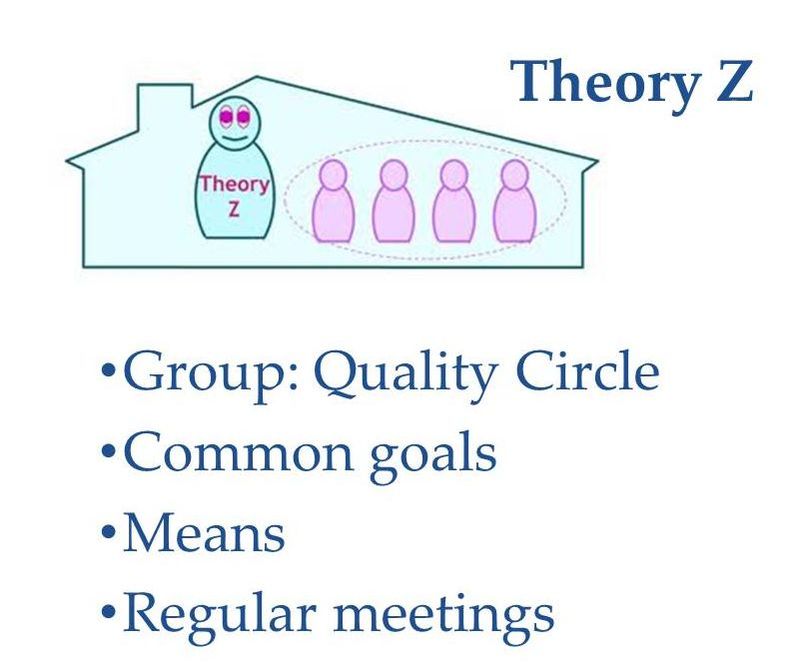 The Theory Z is to involve one part of the family or all, in some common objectives, and struggle to achieve them. So, you form a group, 2 people minimum, you set up the common goals, then come up with some means to try to achieve them and you make an effort to achieve them. So, everyone struggles to improve, everyone helps each other and we all control our successes and failures. A periodic meeting is basic to follow the struggle and results. And to come up with new means if necessary. I mom was telling me that her three young boys shared a room and they were very disorderly. She applied the theory and the results were incredible! This theory is also a great way to unite the family. To struggle as a team, increases the motivation. You can use the Theory Z between mom or dad and / son daughters, older/younger brothers, etc. Ex. Family that is always late and never on time to invitations, church, school, etc. can work together on the the goal: arrive on time. Ex. Or if a father and a daughter struggle with Order: Daughter: toys and closet Dad: desk and drawers. The contents of this lecture were taken from different sources:
Educar la Voluntad by Fernando Corominas Several lectures given by David Isaacs How can we foster |
AuthorPilar Caranti holds a Masters in Psychology from the Catholic University of Argentina. She is a Certified Professional Life Coach. Family topics and the education of children are her passion. She has given many lectures on parenting topics like: forming the will of our children, authority, education of leisure, pornography, etc. Archives
June 2019
|
